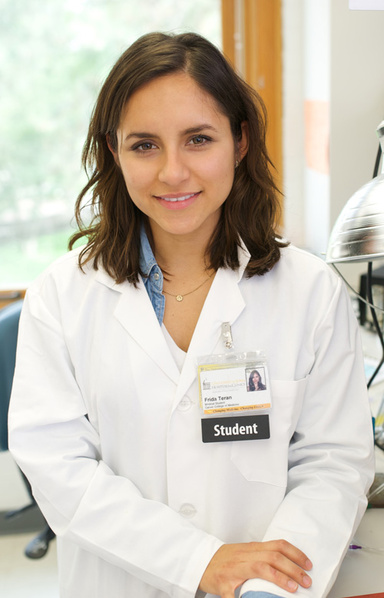Growing up in a small town in northern Mexico, Frida Teran watched how her father—a doctor of internal medicine—interacted with his patients. The care he provided and the empathy he showed sparked within her a curiosity for medicine.

“Ever since I was little, I clearly remember him coming home from the hospital or just seeing patients, and I was always very curious about my dad taking care of other people,” she says. “I knew my dad as my dad—but when I saw him be someone's doctor, it was like I was seeing an entirely different person. The patient-doctor relationship is something that I consider so sacred, and my first exposure to it was with my dad. So, when I saw that, I thought, ‘I want to be someone like that.’”
Teran went on to complete her undergraduate degree in San Antonio before coming to Iowa in 2014 for the UI Carver College of Medicine Medical Scientist Training Program, which offers MD and PhD degrees in a combined curriculum. Teran had realized her affinity for research in addition to clinical medicine after participating in the college’s Summer Undergraduate MSTP Research Program in 2012.
Ultimately, her goal is to not only to help patients directly but also indirectly through medical research.
“As a doctor, you get to see patients on an individual basis and help them, but when you come back to lab, you get to think about the bigger problem,” she says. “So, my goal is to come up with better treatments, and from there, I can help not just one patient, but entire fields by contributing.”
As she nears the completion of her degree program and prepares for medical residency training following graduation in spring 2023, Teran is being recognized for her contributions to the UI and local communities over the last several years. This fall, she recently received the María Cano Martínez Service Award, which recognizes students who promote understanding and the study of Chicanx/Latinx issues through scholarly and social activity.
Among others, Teran has been most involved with the Latino Medical Student Association (LMSA). She initially became a member as a medical student, then pursued a leadership position while completing her PhD because of her passion for teaching Spanish medical vocabulary.
Teran initiated a program called “Conversations in Spanish Lunch,” which she describes as a low-key meeting where medical students could role-play an English-speaking doctor, a Spanish-speaking patient, and a translator or interpreter and practice how to communicate with Spanish-speaking patients and their families.
I knew my dad as my dad—but when I saw him be someone's doctor, it was like I was seeing an entirely different person. The patient-doctor relationship is something that I consider so sacred, and my first exposure to it was with my dad. So, when I saw that, I thought, ‘I want to be someone like that.’
-Frida's memory as a little girl
“I thought it would be very useful for us medical students,” she says. “A few of us spoke Spanish but didn’t necessarily know how to use that in the medical context. You can easily learn Spanish medical vocabulary, but how do you actually address patients from different backgrounds—not just from Mexico, but from other places in Latin America? You have to consider the cultural layer and how it affects their health care.”
When the COVID-19 pandemic hit, Teran created a “cheat sheet” of basic and helpful terms—how to wash one’s hands properly or communicate important information about the vaccine, for example—titled, “How to Speak About Coronavirus in Spanish.”
The guide was shared by the national LMSA organization, which Teran says made it the highlight of her role in the UI chapter.
“There are a lot of cultural aspects of Latin America—like a lot of hugging, a lot of kissing, and family gathering—so I emphasized that we need to be careful,” Teran says. “I shared that on Twitter, and a lot of people started sharing it and then started translating it to over five different languages, so that’s pretty exciting. It was nice to see my little piece of contribution going around.”
After being LMSA co-president for a couple of years—during which time she organized outreach events for medical students in West Liberty, Iowa, mentored minority undergraduate students applying to medical school, and worked the organization’s booth at the Des Moines’ annual Hispanic Heritage Festival—Teran has passed on the torch but says she hopes to continue seeing the organization grow.
To be recognized for her efforts with the María Cano Martínez Award—which is named for a dedicated UI and Iowa City social worker, community member, and encouragement to the Spanish-speaking community to pursue higher education—is an honor, Teran says.
An equally amazing experience to receiving the award was getting to meet and have long conversations with Martínez’s family members, including her son.
“I was able to learn about her life and contributions and what’s been done since,” she says. “Learning her story was so touching, and it felt like such an honor to be given an award named for someone like her.”
After defending her PhD thesis in August, Teran has reentered the clinical setting and is working to complete her clinical clerkships in surgery.
“Long term, I'd like to stay here in Iowa for my residency program,” she says. “I'm interested in doing a neurology residency and then hopefully to be a faculty member at an academic institution, where I get a chance to teach.”
Learn more about Iowa's Medical Scientist Training Program (MSTP)